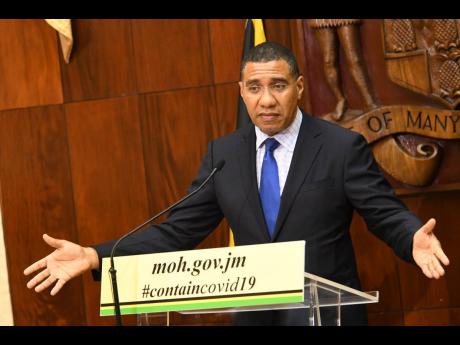Peter Espeut | The prime minister’s dilemma
Marisa Colleen Dalrymple-Philibert resigned as member of parliament on September 21, 2023; since then, the 26,564 residents (2011 census) of Trelawny Southern – of whom 19,716 are registered voters (2020) – have not been represented in Parliament, and there is no talk of a by-election any time soon.
Why would the ruling Jamaica Labour Party (JLP) leave the people unrepresented for so long? According to the math, it is a safe JLP seat: in 2020 Dalrymple-Philibert won many more than twice the votes as her opponent – 7,093 to 3,030. Is it that the JLP fears that the extent of the national swing towards the People’s National Party (PNP) will be exposed in a by-election?
The Jamaican Constitution does not stipulate a maximum period for which the constituents can remain unrepresented. The situation with local government is different; until last month the Representation of the People Act (ROPA) outlined that a parish council by-election should be held within 90 days of the vacancy; claiming hurricane damage, the government has extended the period by a further 90 days; but at least there is a definite period; for parliamentary constituencies like Trelawny Southern, the vacancy can go on indefinitely. The ROPA (or the Constitution) needs to be amended to prevent an election-averse government from denying Jamaicans the right to parliamentary representation for an unreasonable length of time.
Nigel Andrew Lincoln Clarke is vacating not only his cabinet post but also his parliamentary seat in St Andrew North Western sometime in October. Will that seat also remain vacant indefinitely thereafter? If so, that will mean that 3.2 per cent of the seats in Jamaica’s Parliament will be vacant for an extended period, which would be unconscionable and undemocratic.
Or will the St Andrew North Western seat be filled by Nigel Clarke’s successor, likely to be chosen from outside Gordon House (like he was)? And if so, can the prime minister call one by-election while leaving the other seat vacant? Explain that to the people of Trelawny Southern!
By the time Nigel Clarke departs Jamaica in October, the next general election will be due in about 10 months; and with the notice period for nomination day and the campaign period before by-election day, the by-election(s) would be less than nine months before the expiry of the government’s term in office. Is it practical (and fiscally prudent) to hold a by-election, and then the same candidates will have to contest again a few weeks later?
CALL ELECTION THIS YEAR
Or does it just make good sense to call the general election this year and be done with it? It is the prime minister’s call.
But then again, there are complicating factors.
Assuming that all the “illicit eight” – those we know of currently under investigation by the Integrity Commission for illicit enrichment – sit in the lower house, can the JLP propose them to be nominated for the upcoming election with clouds hanging over their reputations? What would that say about the party? That is one dilemma facing the prime minister.
The failure of the certification of the prime minister’s own integrity declarations over the last few years is also a factor. Can PM Holness contest a general election with his declarations uncertified? How could he credibly campaign against corruption?
That is another dilemma facing the prime minister.
With Nigel Clarke in place as finance minister, polls conducted months ago – and the local government elections themselves – indicate a strong swing away from the JLP. With Nigel, the JLP could campaign that their side has “the best finance minister in the history of Jamaica”, and that would count for something.
LIGHT QUITE DIMMER
With Nigel absent from the JLP slate of candidates, the JLP’s light is quite a bit dimmer, and their bell will not sound so strong.
If a moot point was “with Nigel Clarke in the finance ministry, can the JLP win the next general election?”, it must also be moot whether the JLP is electable without Nigel Clarke!
Nigel is a smart fellah! He has a good sense of timing.
Nigel Andrew Lincoln Clarke will be a hard act to follow. Whoever takes his place will be on a steep learning curve, and will have only a few weeks to make a good and lasting impression on the electorate.
Whoever that person is, they will be in the hot seat! In addition to performing as cabinet minister they will have to be omnipresent in St Andrew North Western; that is also a safe JLP seat, but it would be dangerous to take it for granted.
Maybe by November Sir Daryl will have cajoled/steamrollered JPS to withdraw (even temporarily) its bloated electricity bills to customers who had little or no service post-Beryl; and maybe the hurricane relief money would have all been distributed by then, to soften the blow.
It might be simpler just to call general election in November. I don’t know, though, if that would resolve the prime minister’s dilemma!
Peter Espeut is a sociologist and development scientist. Send feedback to columns@gleanerjm.com

